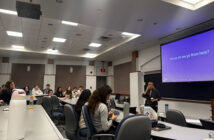Growing up, I bounced all over the country. I was born in northern New Jersey, roughly 15 miles outside of New York City. I lived there up until I was 7 years old, eventually moving to Colorado for one year, then Washington state for four. Most of what I remember is my latter childhood years, in my small, fairly rural town in Washington — where I lived from third to sixth grade.

Chrissie Faenza
I felt like a “star student” growing up there. I was constantly praised by all of my teachers, who would grant my parents the ability to boast about having such a smart kid. All my report cards were wiped clean with As in every subject. I felt set up for definite success for the rest of my life.
When I heard that we would be moving back to my hometown in New Jersey, I was confident that it would be a simple adjustment in terms of switching public middle schools and staying there until high school graduation. After all that I had been told, why would I not have the right to that confidence?
I sat before my guidance counselor a week before my first day, where he told me he would not place me into the accelerated classes on any subject, but rather the regular classes.
“We do things differently here,” he told me.
And he was right — my classes threw me into a complete spiral. My coursework in “regular” leveled classes felt beyond more difficult. My first semester report card was bruised with three Cs. I felt so ashamed that I stuffed it in the back of my closet and hoped my parents would not bother to ask about it.
I didn’t quite understand. I gave the same amount of time and effort as I did back at my old school, but fell far too short of what was expected of me at my new school.
Both were American public education, only different in terms of regions. Why was I told that I was gifted in one place, but below-average in the other?
I assumed that all public education in America would be the same. Kids living in one area of the country should have the opportunity to equal public education as kids living in a completely different area — because that’s only fair.
Many of these issues of inequality in public education derive from government funding. Public school districts are funded via property taxes, and hence, wealthier communities will have more money put into their school districts versus poorer communities.
As a result, the overall quality of public education one receives is dependent on the average socioeconomic status of his or her community.
Through a tool from The New York Times, I found that my new school district in New Jersey is nearly three whole grade levels ahead of my old school district in Washington. What I was doing as a freshman in New Jersey is comparable to what I would be doing as a senior in Washington.
The whole situation wasn’t my fault, nor was it my parents’ fault. Nothing changed about us other than the fact that we moved across the country and I was placed into a new school district that happened to be generally wealthier than my past one. In turn, the new education I received hit me like a ton of bricks.
It took nearly three years for me to completely readjust. By high school, I was able to fully catch up and work hard enough to pull ahead. Yes, I am happy that I put in the extra work to get to where I wanted — now here at Lehigh — but why did I have to?
The fact of the matter is that not all public schools in the U.S. are at the same level — some are drastically different from others. In my opinion, the explanation as to why we aren’t all getting equality in public education is very unclear. The laws are just the way they always have been — no further questions asked.
Based on my own and others’ experiences, it became clear that it is simply unfair this way. I wrongfully assumed that every public school student across the U.S. was receiving an equivalent education and was entitled to the same opportunities.
Chrissie Faenza is an associate lifestyle editor for The Brown and White. She can be reached at chf222@lehigh.edu.






Comment policy
Comments posted to The Brown and White website are reviewed by a moderator before being approved. Incendiary speech or harassing language, including comments targeted at individuals, may be deemed unacceptable and not published. Spam and other soliciting will also be declined.
The Brown and White also reserves the right to not publish entirely anonymous comments.
2 Comments
Welcome to the real world. Now ask your fellow students about private education.
Amen.